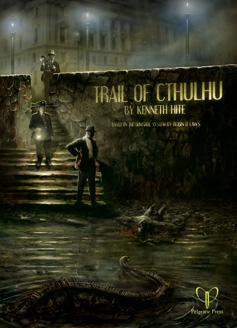 Reading the Cthulhu version of Esoterrorist's GUMSHOE system a few months later, I really enjoyed the fresh take on the mythos, and was hopeful I'd get to run it some day. Since then, I'd happily lifted GMing advice from it for use with other games. However, my first session of Trail of Cthulhu was a little shaky, and events in life kept us from getting to the second session until this weekend, so the fate of the campaign was a little iffy.
Reading the Cthulhu version of Esoterrorist's GUMSHOE system a few months later, I really enjoyed the fresh take on the mythos, and was hopeful I'd get to run it some day. Since then, I'd happily lifted GMing advice from it for use with other games. However, my first session of Trail of Cthulhu was a little shaky, and events in life kept us from getting to the second session until this weekend, so the fate of the campaign was a little iffy.I'm happy to report that despite that uneven start nearly a month ago, and despite having a lot on my plate this past week, the most recent session freakin' rocked! I'm on a roll.
Seriously, this was probably my favorite RPG session in just over two years. Most of the really good sessions I've run lately were very light and mostly humorous games, and it had been a while since I'd pulled off a more dramatic session that I was really truly proud of.
Those of you who've gamed with me for years are well aware that the style I most like to run is artsy and character-driven, with some pretty weighty method-acting and frequent moral dillemas. Since moving to Seattle some 20 months ago, I've really only successfully achieved that in a single session of a campaign, and I was missing that style of gaming. Since Continuum, I'd been running games that were more about problem solving then character dynamics, and more often over-the-top than fully-realized. Mostly featuring briefly sketched-on-the-surface characterizations instead of the deeper theatre-in-the-round experience. Continuum, too, while featuring very cerebral multi-layered plotlines, had fairly shallow character studies. Trail of Cthulhu, however, is a perfect match for the style of game I'd been wanting to run. The mechanics are really minimal and easy to remember. They mostly fade into the background, and never seem to conflict with gut instinct or real-world logic, so you can focus your energies on setting, story, and character portrayals.
Our session involved only a single die roll - but don't interpret that to mean nothing happened. Most skill uses (in the system) don't involve dice, they just involve reminding the GM that you have the relevant skill, and possibly spending a point of it. It's just like CSI or Sherlock Holmes - they never fail to collect the finger prints or find the bloody murder weapon, as long as they take a moment to search the room where the clue is. At the same time, there's a decent chance the Player Characters will be preoccupied and forget to search the room. First session, I hadn't quite figured out all the implications of how that works, but having several weeks between sessions let me process if further, and better refine how I structured the clues.
It worked like a charm this time. The system is so light, you can concentrate on the clues, the characters, and the scenes - and not worry about balancing monster stats, looking up lengthy combat options, or setting the difficulty and consequences of a search roll so that success isn't guaranteed but failure doesn't completely derail the plot. It was liberating.
The downside is that a fair amount of prepwork goes into the game. That's less a function of the rules, and more a function of the format of mystery scenarios. Building an investigative plotline that holds water and is bolstered with the proper amounts of verisimilitude isn't easy. There's a delicate balance to be achieved. 95% of the time, you want to give the players just the clues, let them draw their own conclusions. The danger of that is that sometimes they'll jump to some idea that is completely at odds with the connection you expected them to make. In those situations, you need a way to get them back on track, prefferably via an organic and in-character means. Not only do you prep the scenes you're hoping to run, but you also have to put a bit of thought into scenes you hope to never run, scenes where even the unintended red-herrings eventually somehow lead back to the main plot.
And yet, at the same time, failure needs to still be possible - if the players ignore your subtle attempts to redirect and pursue the wrong threads repeatedly, or worse yet, spin their wheels ineffectively or dither, there must be some sort of consequence. The trick, then, is to come up with consequences that add to the drama, instead of short-circuiting it. Trail of Cthulhu and Esoterrorists, with their rules-light approach and solid narrative-building advice, make that whole mystery-crafting process a lot easier than in most games.
No comments:
Post a Comment